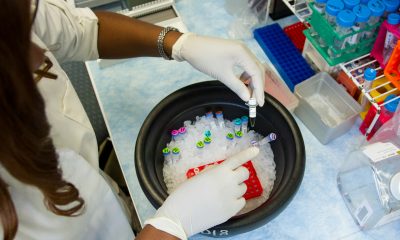Biotech
CAR-T: A Revolution with Spain at the Forefront
Gene therapies, including CAR-T, are revolutionizing medicine, with advancements like CRISPR expanding possibilities. Spain excels in transplants and CAR-T access, doubling authorized centers since 2023. Academic CAR-T therapies lower costs but require a unified European regulatory framework. Expanding treatment centers is crucial for equitable access, ensuring Spain remains a leader in gene therapy and personalized medicine.

Gene therapies have transformed the treatment of rare diseases, cancer, and inherited disorders . While some seek to correct defective genes, others, such as CAR-T, modify immune cells to fight disease. Their development continues to expand, with emerging technologies such as CRISPR and RNAi promising new applications in personalized medicine.
A case of a patient who was disease-free after 18 years of receiving an experimental CAR-T therapy was recently confirmed, showing the potential impact of these therapies on serious oncohematological diseases. CAR therapies are set to expand beyond liquid tumors , experts say.
R&D cost CAR-T therapies
It is understandable that academic CAR-T therapies developed in public hospitals and research centers are cheaper than those developed by pharmaceutical companies. This is possible because of the elimination of costs associated with development, registration, additional regulatory requirements, patents, profit margins and large-scale distribution, among other aspects that academic CAR-T do not have.
All of these activities significantly reduce the cost of treatment when carried out in a hospital. Furthermore, public funding and the non-profit nature of these institutions allow them to focus on accessibility. However, these therapies cannot replace commercial therapies, but must be understood as a complement to the existing offer.
Pharmaceutical companies play a key role in innovation, bringing treatments to a global scale with the highest standards of safety and efficacy, something that local developments cannot yet guarantee uniformly. The consolidation of academic CAR-T therapies in some European countries is a promising development, but their success should not depend only on isolated initiatives. A common regulatory framework at European level is essential to guarantee patient safety and offer researchers legal and scientific stability to continue developing these academic therapies.
“If Europe aspires to lead in personalized medicine, it needs to harmonize the production and application of these therapies.”
If Europe aspires to lead in personalised medicine, it needs to harmonise the production and application of these therapies in a coordinated system, ensuring quality and equitable access. Only in this way can a model be consolidated in which academic therapies are a realistic alternative within a constantly evolving ecosystem.
Leaders in transplants
In absolute terms, Spain has consolidated its position as a world leader in organ transplants . In 2024, a total of 6,464 transplants were performed in the country, representing an increase of 10% compared to the previous year. This is possible thanks to the generosity of 2,562 deceased donors, reaching a rate of 52.6 donors per million inhabitants, and 404 living donors. These statistics position Spain above other countries such as the United States, Italy and France in terms of organ donation.
This leadership is attributed to the efficient management model of the National Transplant Organization (ONT), which coordinates a highly trained hospital network and promotes a culture of solidarity and awareness about organ donation in Spanish society. The complexity of transplants coincides in many aspects with the administration of gene therapy such as CAR-T.
Leadership in CAR-T
Spain is increasing the number of centres authorised to administer CAR-T therapies. This effort seeks to improve accessibility and equity in the treatment of patients with haematological and oncological diseases who benefit from these advanced therapies.
In June 2022, the Ministry of Health announced the designation of 15 centres for the administration of CAR-T therapies. Since 2023, the existing healthcare capacity has doubled, adding a total of 28 centres across the country. This expansion allows more patients to access innovative treatments without having to travel long distances.
Despite these advances, experts point out the need to continue expanding the network of authorized centers . The increase in therapeutic indications and the number of patients who are candidates for CAR-T therapies could generate an overload in the current centers. Therefore, a further expansion of the network is recommended to guarantee greater geographic equity and timely access for all patients.
Experimental cancer drugs are often concentrated in Madrid, Barcelona or Navarra , which prevents other regions from benefiting from initiatives such as the creation of specific units for clinical trials. Recently, the Miguel Servet Hospital in Zaragoza announced the creation of a Phase I unit , which complements the therapeutic offer and provides new opportunities for patients who do not respond to conventional treatments.
Spain continues to strengthen its healthcare infrastructure for the administration of gene therapies such as CAR-T, with the aim of maintaining its leading position in Europe and ensuring that all patients who can benefit from these therapies have access to them in an equitable and efficient manner.
__
(Featured image by Sangharsh Lohakare via Unsplash)
DISCLAIMER: This article was written by a third party contributor and does not reflect the opinion of Born2Invest, its management, staff or its associates. Please review our disclaimer for more information.
This article may include forward-looking statements. These forward-looking statements generally are identified by the words “believe,” “project,” “estimate,” “become,” “plan,” “will,” and similar expressions. These forward-looking statements involve known and unknown risks as well as uncertainties, including those discussed in the following cautionary statements and elsewhere in this article and on this site. Although the Company may believe that its expectations are based on reasonable assumptions, the actual results that the Company may achieve may differ materially from any forward-looking statements, which reflect the opinions of the management of the Company only as of the date hereof. Additionally, please make sure to read these important disclosures.
First published in Gaceta Medica. A third-party contributor translated and adapted the article from the original. In case of discrepancy, the original will prevail.
Although we made reasonable efforts to provide accurate translations, some parts may be incorrect. Born2Invest assumes no responsibility for errors, omissions or ambiguities in the translations provided on this website. Any person or entity relying on translated content does so at their own risk. Born2Invest is not responsible for losses caused by such reliance on the accuracy or reliability of translated information. If you wish to report an error or inaccuracy in the translation, we encourage you to contact us

-

 Fintech2 weeks ago
Fintech2 weeks agoDruo Doubles Processed Volume and Targets Global Expansion by 2026
-

 Business34 minutes ago
Business34 minutes agoDow Jones Stalls Near Record Highs as Inflation-Fueled Rally Awaits Next Move
-

 Business1 week ago
Business1 week agoTopRanked.io Weekly Affiliate Digest: What’s Hot in Affiliate Marketing [Health Trader Affiliate Program Review]
-

 Africa5 days ago
Africa5 days agoAir Algérie Expands African Partnerships





















